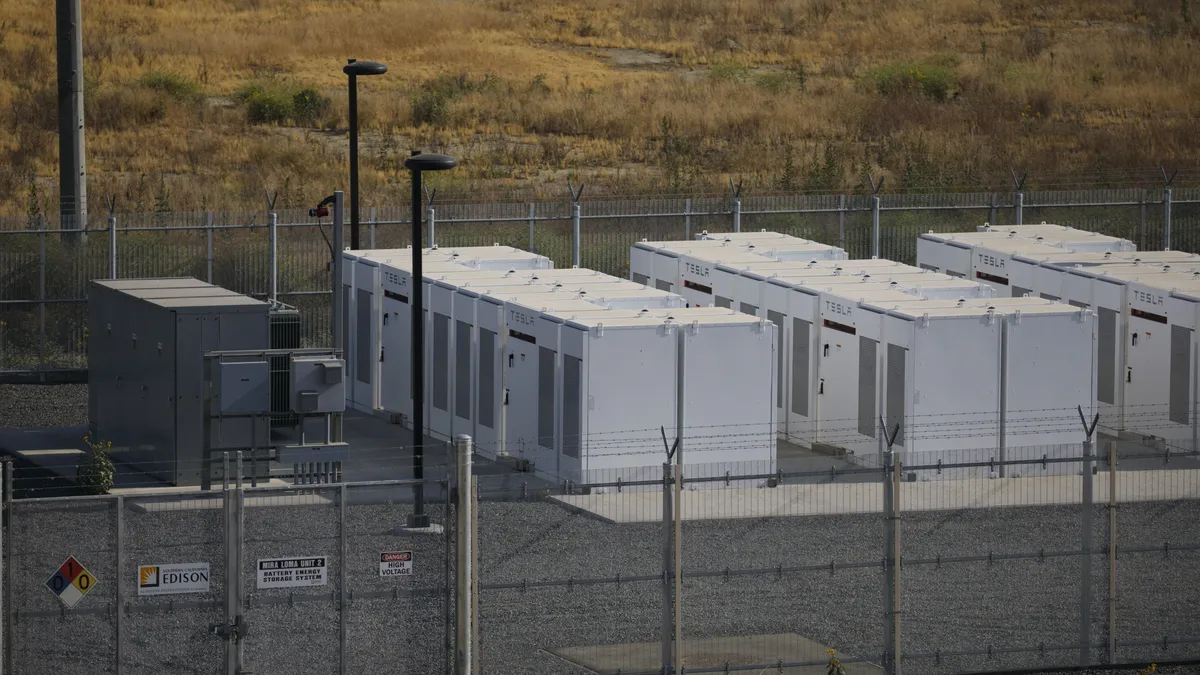Dive Brief:
- Generators NRG Energy, NextEra Energy Resources and Vistra Energy filed comments with the Public Utility Commission of Texas (PUCT) last week arguing that transmission and distribution (T&D) utilities cannot legally own battery storage under existing state rules.
- Many others, including storage developer Tesla and investor-owned utility Oncor Electric, argued storage ownership is permitted through the Public Utility Regulatory Act (PURA), which governs the state's grid. Grid operator Electric Reliability Council of Texas (ERCOT) skipped the question in its comments as part of the rulemaking docket.
- Texas regulators opened the docket in February after rejecting a request from T&D utility AEP Texas to own two battery storage systems. AEP proposed to use storage as an alternative to traditional grid upgrades, but opponents argued it was akin to a utility owning a generation asset, which PURA prohibits.
Dive Insight:
The outcomes of the Texas regulatory docket will determine which companies get to own battery storage and other non-traditional grid technologies in one of the largest U.S. power markets.
At the crux of the issue is defining ownership rights around battery storage, which can act both as generation and load on the power grid.
T&D utilities that operate within ERCOT cannot own generation assets under PURA, but companies like Tesla and Oncor argued AEP's approach in its storage application complied under statutory provisions regarding grid reliability.
"If the storage device is being utilized for permissible transmission and distribution purposes — for the [utility's] 'own needs' — then nothing in PURA prohibits [a utility] from owning an energy storage device," Oncor said in its comments. "If the energy is needed to provide increased reliability in certain portions of a [utility's] system ... and is not being sold by the [utility] as energy or an ancillary service at wholesale, then this is a permissible use."
Generators, however, said the law is cut-and-dried when it comes to storage ownership.
"NextEra is not aware of any legal authority under which a [utility] can own energy storage equipment or other non-traditional technologies to support reliability without a specific exemption in the [PURA]," Nextera wrote in comments, "nor ... of clear prohibitions that expressly preclude a [utility] from utilizing non-traditional technologies in a manner consistent with the framework of [PURA]."
With declining costs of energy storage, Vistra argued that "utilities are not needed to support the development and deployment of nontraditional technologies." In June, Vistra announced the addition of a 10 MW/42 MWh lithium-ion battery for its Upton 2 Solar Plant in Texas to shift its generation to evening peak demand times.
One way around PURA's definitional issues could be to allow utilities to own storage without participating in the state's competitive power market," the South-central Partnership for Energy Efficiency as a Resource (SPEER) said in its PUCT comments. That could involve utilities incentivizing customers to invest in storage and other distributed resources from third parties.
"Utilities should assess transmission and distribution need through transparent planning processes, and communicate those needs to seek non-wires alternatives," SPEER wrote, while continuing "to own equipment that assess distribution system conditions and communicate to third-parties (or customers) to deploy intermittent services."















